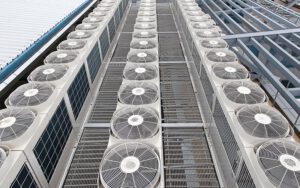The owner of a commercial building is faced with many responsibilities, including the needs of tenants and staff. Not to mention the overall condition of the building, the system must be in good working order. Unfortunately, failure to address issues with the commercial HVAC system can result in a loss of income or clients. However, there are many ways to fix this problem, and these tips will help you do so. Continue reading to learn about these simple fixes for your commercial HVAC system.

Commercial HVAC Lexington KY systems operate by moving refrigerants between gas and liquid. This cycle removes heat from the air, and the commercial building must maintain a certain temperature in the building. These units are available in several configurations, including a rooftop system. Split systems are the most common type, and they work well for small and medium-sized businesses. The outdoor unit is connected to the ductwork throughout the building, and the indoor unit operates through a thermostat.
Split systems are another common type of HVAC system. They are most common for smaller buildings and require manual operation. The split system consists of several air conditioners that are linked together. Each air conditioner distributes air to a different furnace or refrigeration line, controlled independently. Each split unit has its outdoor unit. The evaporator circulates the air, and the cooling tower moves heat outdoors. Once the air inside the building is cooled, it will return to the indoor unit.
Packaged and direct digital controls are other common features for commercial HVAC systems. These systems use a central computer to monitor temperature schedules and lighting operations. These systems are best for commercial buildings because they are more efficient and flexible. However, this method can be costly. Those with larger budgets should look into packaged or direct digital controls. It is recommended to get a package or DDC if you’re concerned about the price tag.
Residential HVAC systems typically feature a single indoor unit and an outdoor unit. These units are usually located in basements or utility rooms. Unlike commercial HVAC systems, these systems require a professional installation. As a result, they can reduce the efficiency of your HVAC system by as much as 30%. Aside from being more complex, residential HVAC systems are also smaller and non-union. Besides, they tend to specialize in a specific brand of equipment. This can make them experts in that particular model but can become boring and outdated with the same gear.
The most common commercial HVAC systems are split and multi-zoned. A split system is the simplest type and is a low-maintenance option. It is comprised of several air conditioners and a few separate refrigeration units. A split HVAC system uses a thermostat to regulate the temperature and humidity. A SMART thermostat allows you to monitor the temperature anywhere in your building. You can control the whole system from the thermostat.
In contrast, residential HVAC systems tend to be simpler, making them less expensive to maintain. As a result, residential HVAC companies are usually smaller and non-union. In addition, they tend to specialize in certain brands of systems and equipment, and their technicians are expected to sell additional products to customers. While this can be lucrative, it is not a good idea to work for a company that only sells a certain gear brand. This will only lead to a lack of profits.
The most common and affordable option for commercial HVAC systems is the variable air volume system (VAV). This system uses a single duct supply and returns design to regulate the temperature of the space. It also allows you to program thermostats to set a specific temperature to control the level of humidity in the room. This system is an effective solution for residential and commercial buildings and will increase the efficiency of your building. In addition, it will help you save money on energy bills by running more efficiently and ensuring that your building stays comfortable.
Among the most common types of commercial HVAC systems are single-split units. The most inexpensive of these systems are perfect for homes and small commercial buildings. They heat or cool individual rooms and can be combined in some cases to serve larger areas. These units are self-contained and require little space to install. These systems are ideal for residential and small commercial buildings as they are cheaper. If you plan to expand your business in the future, you can always add more cooling capacity.